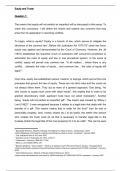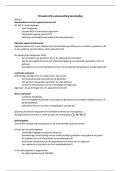Essay
Equity & Trusts Assignment
- Module
- Equity & Trusts
- Institution
- The University Of Bradford (UoB)
The maxim that equity will not perfect an imperfect will be discussed in this essay. To reach this conclusion, I will define the maxim and explore any concerns that may arise from its application in resolving conflicts + Letter
[Show more]






